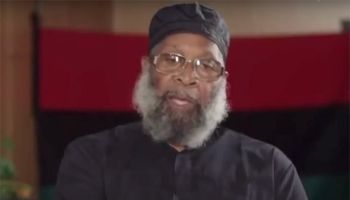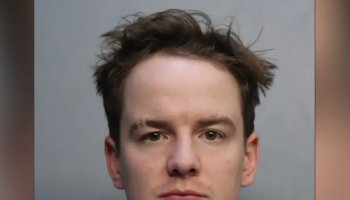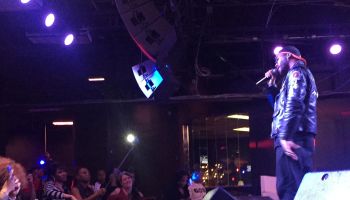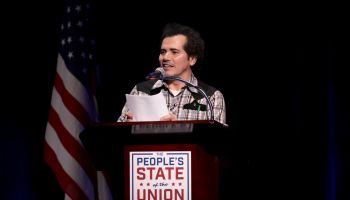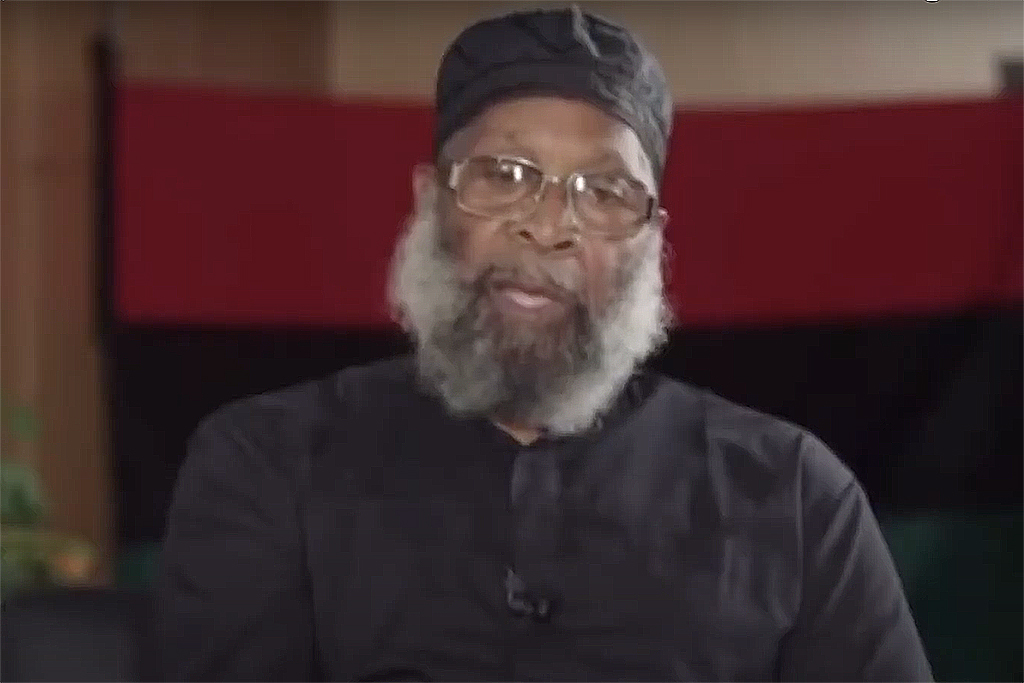
Source: YouTube screenshot
Sekou Odinga, a leading member of the Black Panther Party (BPP) and Black Liberation Army (BLA) who managed to free political prisoner Assata Shakur before becoming one himself and spending decades behind bars, died Friday. He was 79.
The cause of Odinga’s death was not immediately reported.
A GoFundMe raising money to help Odinga said in September that he was recovering and in rehab following an infection.
Odinga, credited as a major force in the Black liberation movement for many decades, served more than 30 years in prison for his roles in a deadly Brinks armored car robbery and a shootout with the police in New York City that culminated in BPP members charged with various acts of violence and conspiracies.
Odinga was simultaneously accused of liberating Shakur, also a BLA member, from a New Jersey prison in 1979. Shakur, who was among the Panther 21 and then-known as Joanne Chesimard, had been convicted of killing a New Jersey State Trooper. The step-aunt and godmother to the late rapper Tupac Shakur lives in Cuba and remains on the FBI’s Most Wanted List.
Born Nathaniel Burns on June 17, 1944, Odinga provided a first-person account of his life in an anthology of political prisoners’ biographies. In Can’t Jail The Spirit, Odinga wrote of his experiences with everything from being a victim of the school-to-prison pipeline as a young man to the lasting impact that Malcolm X had on his life both behind bars and in freedom.
“The teachings of Malcolm X, who was then with the Nation of Islam, became a big influence on me at that time,” Odinga wrote. “I became involved in Black political activity in New York, especially revolutionary, nationalist politics.”
Following Malcolm X’s assassination in 1965, Odinga wrote that he gravitated toward “other young Revolutionary Nationalists to organize ourselves for the purpose of implementing what we felt was Malcolm’s program,” forming the Grassroot Advisory Council organization.
About one year later, having become “thoroughly disillusioned with that” group, Odinga wrote that he turned to the BPP, eventually becoming a founding member of the New York City chapter and the International Section of the Black Panther Party.
Instead of traveling to California to join the movement out west, Odinga said he stayed to “help build the BPP in New York” and became a leader in the city’s Bronx borough with an office in Harlem.
But Odinga said he went “underground” after the murders of two UCLA students who were also BPP leaders and subsequently being told he was wanted by law enforcement “in connection with a police shooting.”
He would stay “underground” for more than a decade, including a brief stint in Algeria organizing for BPP, which Odinga said became “split” because of COINTELPRO, a controversial surveillance program the FBI tried to pass off as only spying on Communists but turned out to be an anti-Civil Rights Movement initiative.
Odinga eventually returned to the U.S. to continue his work. But in 1981, he was arrested and charged with the attempted murder of police officers in a shootout stemming from the robbery of an armored truck transporting cash three days earlier.
“I was charged with six counts of attempted murder of police, for shooting over my shoulder while being chased and shot at by police,” Odinga wrote.
He was convicted in 1984. Odinga was just 39.
In 2014, Odinga was released from Clinton Correction Facility, a maximum security prison in upstate New York.
“It’s an emotional day for us,” Yaseem Sutton, a Black Panther who would visit Odinga in prison, told DNAinfo at the time. “I think you can compare it to Nelson Mandela being released.”
Conversely, one former FBI agent who worked on the armored truck case said Odinga’s release reminded him “of letting al-Qaida members out of jail and they immediately join ISIS.”
Odinga previously explained to Democracy Now! why he joined the BPP.
“What attracted me more than anything else was the stand against police brutality, because, like all the other ghettos in this country or Black areas of this country, police brutality was running rampant,” Odinga said in an interview. “That was the attraction, the big attraction, for me, personally, and many of the comrades that I came in with, because they really — we were not part of the civil rights movement to turn your other cheek. We was mostly followers of the Malcolm X position that if someone smack you, you smack him back; if someone punch you, you punch him back; that your life was the biggest and best thing you had, and you had a right to not only protect it, but to defend it by any means necessary.”
Odinga’s death comes weeks before the state of Black History Month, which he told NewsOne in 2016 should serve as “a reminder of how little we know about our Black history.”
Referencing what he said were irresponsibly diluted stories of Dr. Martin Luther King and Malcolm X, Odinga continued: “I’m glad that they have set a month aside for Blacks, and I hope that the young folks who think about Black History Month realize that BHM should be every day.”
Upon his release from prison, Odinga has remained dedicated to Black liberation and was among the leading voices condemning mass incarceration.
In 2020, during an event celebrating the birthday of Mumia Abu-Jamal, Odinga spoke about his commitment to the plight of all political prisoners.
“The best resource that we have access to is people power. We need to commit to unifying and organizing the power of the people. There are hundreds, if not thousands, of people who already support freeing political prisoners, prisoners of war. We have to find a way to unify and organize ourselves to speak and to demand collectively the release of our political prisoners,” Odinga said before adding later: “we can’t consider our political prisoners criminals if they took to the battlefield. That don’t make them a criminal; that makes them a hero. We have to remember that.”
SEE ALSO:
May Dr. Antionette ‘Bonnie’ Candia-Bailey’s Light Shine On
Mutulu Shakur, Black Liberation Movement Elder And Stepfather To Tupac, Dies At 72
The post Sekou Odinga, Movement Elder And Former Political Prisoner Who Freed Assata Shakur, Dies At 79 appeared first on NewsOne.
Sekou Odinga, Movement Elder And Former Political Prisoner Who Freed Assata Shakur, Dies At 79 was originally published on newsone.com








